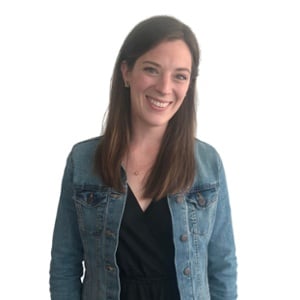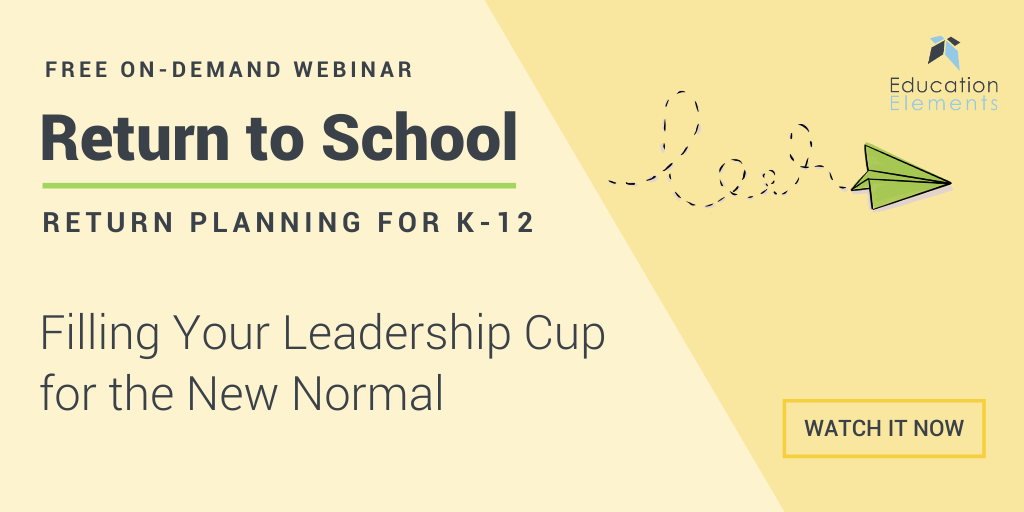
What's Left, What's Lost, and What's Possible
Innovative Leadership | District Leadership
Leading While Grieving In The Wake of COVID-19
In the Fall of 2019, I lost my husband. After the dust settled from the initial crisis, I was inundated by having to make sense of what had happened, trying to figure out where I would live, and navigating what the future would look like for myself and my son. Overwhelmed by the sheer amount of stuff to process, my therapist gave me a frame to help me reflect on the experience and move forward:
- What’s left?
- What’s lost?
- What’s possible?
This frame enabled me to focus on one question at a time while also moving through my grief. My initial concerns focused on what was left: I needed to take stock of my new life as a single parent so that I could make key decisions about where to live, where to send my child for school, and figure out what I needed on a basic level. I then worked through (and continue to work through) what I lost. It was several months before I could even begin to contemplate what was possible.
A few months later, the COVID-19 pandemic shut down the world. As birthday parties, weddings, graduations, jobs, and last days of school changed or disappeared, I recognized the notes of grief in my family’s, friends’, and colleagues’ voices. While they were moving through the pandemic, I noticed every person was focusing on one of those questions. A friend mourning the change in her daughter’s graduation ceremonies focused on what was lost: “I feel like she’s not getting her moment” I heard her say. My brother, determined to get married in May, immediately focused on what was possible in order to make sure he still had his big day. My mother, focusing on what was left, found that walking and running were a good way to reinvest in her health while staying socially distant and healthy.
Every person’s experience with change and loss is different. As we approach the start of the year, it seems inevitable that plans will change and that the school year will, once again, be different for our staff and students. We will grieve the loss of school as we know it: How will the first day of school excitement be different if we’re remote or six feet apart? These changes will bring with them many emotions and feelings of loss. As a leader, use the three questions frame in two ways: 1) to think about and process your own experience through this stressful time and 2) to understand where those in your school district might be so that you can best support them.
Know Yourself
At Education Elements, we have developed a set of six foundational competencies we believe are core for innovative leaders. In one, Know Yourself, we ask leaders to consider how their life experiences, values, and strengths impact their leadership philosophy and practice. This includes taking time to reflect on how something like the COVID-19 pandemic has affected us personally and as leaders.
This pandemic has been especially stressful for school and district leaders making decisions that will impact lives and potential well-being across their communities. Taking time to process your experience and reflect on how you’re doing is imperative. So, take a few minutes to reflect on the three questions above. As you do, notice where you start: which question is easiest for you to answer and which one is most difficult? As we move through the year, revisit the questions and take note of where you are, has it changed?
Listen Deeply
Each of us process major changes in different ways. The question you are able to focus on at a given moment may be different from your colleagues and may mean, at times, you’re referencing entirely different experiences or talking past each other. In addition to reflecting and checking in on yourself as we start the school year, check in on your colleagues. Carve out time to process as a group, using the three questions if it’s helpful. In the same way you might use strengths or personality tests to better know and collaborate with your team, understand where they are in their grief. As you build plans for the year or have to shift gears, once again, acknowledge it.
This past spring, I noticed that there were times when I heard two district leaders talking about a shared challenge who were at different places in their grief. This created a barrier for our conversations. Consider graduations this past spring. If you had a teammate who was focused on...
- What’s left: they might have approached the situation from a very tactical perspective: we cannot do an in-person graduation because we can’t have more than 10 people in the auditorium. We can only have 1000 people on Zoom at a time.
- What’s lost: they might have approached it from an emotional perspective: I don’t think we’ll ever be able to recreate the experience for students and parents in these conditions.
- What’s possible: they might have approached it from a design perspective: I think we might be able to create a new tradition here.
If the leader in the room is focused on what is possible while their collaborator is focused on what is lost, the disconnect can impede progress. Rather than push forward with a new plan, acknowledging what is lost might open communication that helps bridge the gap between the two leaders. Consider asking something like “when you think about what is hard about not doing graduation, what do you think is the hardest part? Is there a way we can capture that to ensure it is part of this new approach?”
Everyone grieves differently. As you consider how to lead effectively while we all grieve the changes in our daily and school lives from the pandemic I hope you’ll find these questions useful. Take the time regularly to reflect for yourself on what’s left, what’s lost, and what’s possible. Then, take time to check in with your team and better understand and support what they’re experiencing so that you can move forward and through this challenging time together.
About Lauren Acree
Lauren Acree is a member of the Design and Implementation team. She partners with educators at all levels to meet the needs of all learners and ensure their success. Prior to working with Education Elements, Lauren worked at the Friday Institute for Educational Innovation at North Carolina State University. During her time at the Friday Institute she partnered with schools and districts implementing digital and personalized learning initiatives. She managed the learning differences programs which built capacity for teachers and students to understand learner variability and design learning experiences that meet the needs of all learners. Lauren also started and led the micro-credentialing program for educators where she developed 50 micro-credentials that received more than 5,000 submissions from educators across the United States. Prior to her work at the Friday Institute, Lauren taught special education in elementary and middle schools in Tulsa, Oklahoma. Lauren received her B.A. from the University of Richmond and her Master in Public Policy from Duke University.



.png?width=932&name=Explore%20all%20the%20innovative%20leadership%20competencies%20(2).png)
